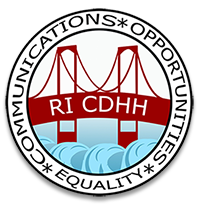Interpreter Specializations
Interpreters work in a variety of settings, such as schools, government agencies, hospitals, courtrooms, employment settings, public events, trainings, workshops, and more. Like doctors, attorneys, and other practice professionals, interpreters develop areas of specialization based on interest, skill, experience, and certification. Following are some examples of interpreter specializations*
Sign Language Interpreters who specialize in healthcare interpreting may work in hospitals, clinics, private physician’s offices, rehabilitation centers, and nursing homes. They require specialized knowledge of medical vocabulary and discourse, healthcare systems, and personnel functions and must be able to navigate professional relationships with both patients and healthcare providers. In addition, they must be able to handle ethical challenges that present on the job. Interpreters are most effective when they are regarded as an essential member of the healthcare team.
Sign Language Interpreters who specialize in legal interpreting may work for the courts, law enforcement agencies, or private attorneys. They may interpret for law enforcement investigations, interview and interrogations, client-attorney interactions, and civil and criminal court proceedings.
Working in the legal setting requires advanced interpreting competence—including the ability to fluently execute consecutive and simultaneous interpreting of complex texts, work effectively in teams—particularly the ability to work collaboratively with Deaf Interpreters (DIs), and to adapt language use to a wide range of sign language users. Further, it requires an in depth understanding of law enforcement and the legal system.
There are unique parameters impacting the work of interpreters in this setting that are the result of case law, legal and evidentiary procedures. Typically, the knowledge and skills required of interpreters to work in this setting are acquired after completion of a solid academic foundation in interpreting, coupled with multiple years of practice, followed by specialized training in legal interpreting, supervised field experience, and culminating in a specialized certification.
Sign Language Interpreters who specialize in K-12 educational interpreting may work in elementary, middle, and high schools. They require specialized knowledge of child development, language acquisition and development, subject areas such as mathematics, social studies, and language arts, for example. They must be knowledgeable of all educational content areas, including those that are highly technical. Interpreters who work in these settings must understand that social opportunities for the student are critical and must be able to effectively interpret peer interactions as well as classroom instruction and discussions. Interpreters are most effective in these settings when they are regarded as an essential member of the student’s educational team. According to state law in Rhode Island, Sign Language Interpreters are required to take the Educational Interpreter Performance Assessment (EIPA) to be eligible to work in K-12 educational settings.
Sign Language Interpreters who specialize in mental and behavioral health interpreting may work in day programs, in-patient and out-patient settings, private clinician’s offices, clinics, emergency rooms, forensic and court-ordered settings, and long-term residential care facilities. They may interpret for psychological evaluations, psychiatric assessment and treatment, group and individual psychotherapy, counseling sessions, substance abuse treatment, and more.
These interpreters require specialized knowledge of the unique vocabulary that is used in mental and behavioral health settings, an understanding of therapeutic techniques used by mental health providers, and possess the interpersonal and intrapersonal skills to handle highly charged situations. They must understand how communication is impacted by cognition and emotion and be prepared to collaborate with Deaf Interpreters (DIs) when working with consumers who require those specialized services. Interpreters are most effective when they are regarded as an essential member of the mental/behavioral health team.
Sign Language Interpreters who work with individuals who are deaf-blind undertake specialized training to learn how to effectively communicate, guide, and provide information about the interpreting environment to the consumer. For example, the interpreter provides both auditory and visual information, modifies the signing space and distance from the deaf-blind consumer, and may incorporate subtle grammatical markers ordinarily visible on the face into the interpretation. Interpreters must also be cognizant of their attire to ensure that clothing contrasts with his/her hands and be aware of any environmental concerns, such as lighting and glare, that could affect the interpretation. Finally, interpreters must be knowledgeable of various communication methods when working with deaf-blind individuals (Pro-Tactile ASL, Haptics, etc.)
This Sign Language Interpreter is a deaf professional who works most often in tandem with a hearing interpreter. He/she is a specialist who provides interpreting, translation, and transliteration services in American Sign Language and other visual and tactual communication forms used by individuals who are deaf, hard-of-hearing, and deaf-blind. These Sign Language Interpreters have specialized training to be able to successfully communicate across all types of interpreted interactions, both routine and at-risk and with a wide variety of visual language and communication forms influenced by region, culture, age, literacy, education, class, and physical, cognitive, and mental health. In many situations, use of a deaf interpreter enables a level of linguistic and cultural bridging that is often not possible when hearing ASL-English interpreters work alone.
